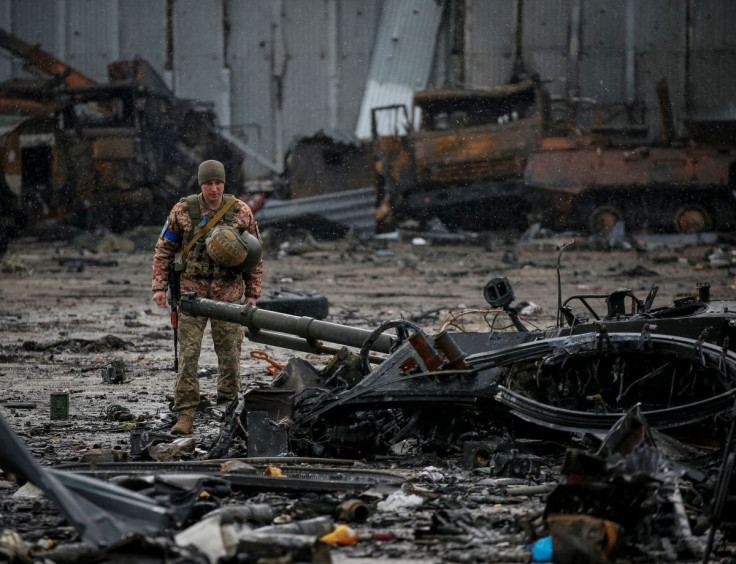Global Outcry At "war Crime" Killings Near Kyiv As Fighting Shifts East

Global outrage spread on Monday at civilian killings in north Ukraine where tied bodies shot at close range, a mass grave and other signs of executions were found in a town retaken from Russian troops, as the focus of the conflict shifted elsewhere.
The destruction and civilian deaths in Bucha outside Kyiv looked set to galvanise the United States and Europe into additional sanctions against Moscow, with officials raising the prospect of restrictions on Russia's energy exports.
The discoveries were also poised to overshadow peace talks between Russia and Ukraine, due to restart on Monday against a backdrop of artillery bombardments in Ukraine's south and east, where Russia says it is now focusing its operations.
Taras Shapravskyi, deputy mayor of Bucha around 40 km (25 miles) northwest of Kyiv city, said around 50 victims of extra-judicial killings by Russian troops had been found there after Kremlin forces withdrew late last week.
Ukrainian authorities said they had found 421 civilian casualties near Kyiv by Sunday and were investigating possible war crimes in Bucha, a description also used by French President Emmanuel Macron and, in reference to Russia's broader offensive, by the U.N. High Commissioner for Human Rights.
The Kremlin categorically denied any accusations related to the murder of civilians in the town.
In other areas of the country, Reuters saw more makeshift burials but could not independently verify the number of dead or who was responsible.
In the village or Motyzhyn west of Kyiv, its reporters saw three bodies in a makeshift forest grave. An adviser to Ukraine's interior ministry said the victims were the village's leader and her family.
In Bucha, Reuters saw one man sprawled by the roadside, his hands tied behind his back and a bullet wound to his head. A mass grave at a church remained open, with hands and feet poking through red clay. Satellite images showed a 45-foot-long trench.
Ukraine's President Volodymyr Zelenskiy described the Russian military campaign as "genocide", a term he has used at different times during the war, saying his counterpart Vladimir Putin was intent in eliminating the nation and its people.
"We are the citizens of Ukraine and we don't want to be subdued ...This is the reason we are being destroyed," he told CBS' "Face the Nation" news program.
FLATTENED BY SHELLING
On the other side of the country near the Black Sea port of Odesa, Ukrainian television showed smoking fuel tanks and fire trucks near the Black Sea port of Odesa. Russia said it had destroyed an oil refinery used by the Ukrainian military.
In Mariupol, another strategic southern port that has been under siege for weeks, Reuters images showed three bodies in civilian clothes lying in the street, one against a wall sprayed with blood. Outside a damaged apartment building a group of residents buried other dead in a shell crater.
"It is easier to dig here," one resident said, saying four bodies were in the improvised grave. Nearby, the skeletal remains of residential tower blocks and other buildings surrounded by dust and debris dominated the skyline, Reuters images showed.
Ukraine says it has evacuated thousands of civilians in recent days from the city, which is surrounded by areas in the hands of Russian-backed separatists in the Donbas region.
Ukraine was preparing for what its general staff said were about 60,000 Russian reservists called in to reinforce the offensive there, while British military intelligence also said Russian troops, including contractors from the Wagner private military company, were moving to the east.
Reuters could not independently confirm the claims. Reuters correspondents saw convoys of armoured vehicles belonging to pro-Russia forces near Mariupol.
Serhiy Gaidai, the governor of eastern Luhansk region, said Russia was building up forces to break through Ukrainian defences.
"I am urging residents to evacuate. The enemy will not stop, it will destroy everything in its path," he said in comments carried on Ukrainian television.
SANCTIONS ON RUSSIAN ENERGY?
German Chancellor Olaf Scholz said Russian President Vladimir Putin and his supporters would "feel the consequences" of events in Bucha.
Western allies would agree on further sanctions against Moscow in coming days, he said, though the timing and reach of the new package was not clear.
Germany's Defence Minister Christine Lambrecht said the European Union must discuss banning Russian gas, though other officials urged caution around measures that could cause a European energy crisis.
The foreign minister of Italy, another country reliant on Moscow's energy exports, said it would not veto sanctions on gas.
France's Macron said new sanctions were needed, including on oil and coal, and there were very "clear clues pointing to war crimes" by Russian forces.
As the U.N. Security Council prepared to discuss Ukraine on Tuesday, U.N. Human Rights Commissioner Michelle Bachelet told its Human Rights Council that strikes and heavy shelling during Russia's invasion had killed civilians in acts that might amount to war crimes.
The United States will ask the U.N. General Assembly to suspend Russia from the Rights Council, U.S. Ambassador to the United Nations Linda Thomas-Greenfield said.
Moscow has said the killings in Bucha were "staged" to sully Russia's name, and Kremlin spokesperson Dmitry Peskov told reporters on Monday that the facts did not support Ukraine's version of events there, urging international leaders not to rush to judgment.
Russia has previously denied targeting civilians and has rejected allegations of war crimes in what it calls a "special military operation" aimed at demilitarising and "denazifying" Ukraine. Ukraine says it was invaded without provocation.
Ukraine's foreign minister called on the International Criminal Court to collect evidence of Russian war crimes. France and Britain would support any such probe. Their foreign ministers said.
However, legal experts say a prosecution of Putin or other Russian leaders would face high hurdles and could take years.
© Copyright Thomson Reuters 2024. All rights reserved.







